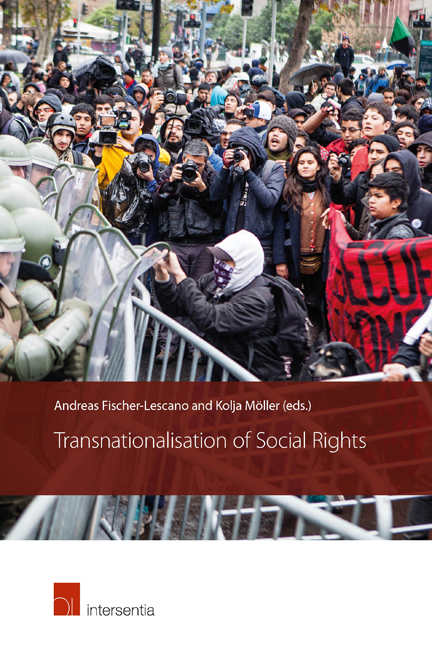Book contents
- Frontmatter
- Contents
- List of Contributors
- List of Abbreviations
- Chapter 1 Introduction
- PART I TRANSNATIONAL SOCIAL RIGHTS IN CONTEXT
- PART II FOUNDATIONS, INSTITUTIONS AND ENFORCEMENT STRUCTURES
- Chapter 5 Enforcement of Transnational Social Rights: International and National Legal Aspects
- Chapter 6 Horizontal Effects of Human Rights: The EU Proposal for a Non-Financial Reporting Framework
- Chapter 7 Labour Rights and the ILO: The Challenge of Transforming Informal Economic Activities to Promote Transnational Social Rights – Domestic and Care Work as Core Issues
- PART III ENFORCEMENT OF TRANSNATIONAL SOCIAL RIGHTS
- Index
Chapter 5 - Enforcement of Transnational Social Rights: International and National Legal Aspects
from PART II - FOUNDATIONS, INSTITUTIONS AND ENFORCEMENT STRUCTURES
Published online by Cambridge University Press: 12 December 2017
- Frontmatter
- Contents
- List of Contributors
- List of Abbreviations
- Chapter 1 Introduction
- PART I TRANSNATIONAL SOCIAL RIGHTS IN CONTEXT
- PART II FOUNDATIONS, INSTITUTIONS AND ENFORCEMENT STRUCTURES
- Chapter 5 Enforcement of Transnational Social Rights: International and National Legal Aspects
- Chapter 6 Horizontal Effects of Human Rights: The EU Proposal for a Non-Financial Reporting Framework
- Chapter 7 Labour Rights and the ILO: The Challenge of Transforming Informal Economic Activities to Promote Transnational Social Rights – Domestic and Care Work as Core Issues
- PART III ENFORCEMENT OF TRANSNATIONAL SOCIAL RIGHTS
- Index
Summary
INTRODUCTION
The enforcement of transnational social rights in international and national legal orders is a pivotal issue for the development of and respect for these rights. Individual and collective human rights are a serious matter as they concern the obligations of states to individuals, and the right to food does, moreover, address a fundamental human need.
Social human rights, as second generation human rights, and, as such, situated at the cross-roads between individual and collective rights, are like the classic first generation ones directed vertically at the respective public body, to wit, the state. Thus, it is the task of states to give these rights the proper effect within their national jurisdictions. Moreover, the distinction between several generations of human rights should not lead to their division. All human rights are, in the words of the 1993 Vienna Declaration on Human Rights, “universal, indivisible, interdependent and interrelated”, and the drafting of two different, yet interrelated, Covenants on the subject-matter should not lead to a different conclusion. The original proposal of the Human Rights Commission was a single document entailing civil and political as well as economic, social and cultural rights, which were subsequently split up in separate documents due to political pressure. Even after the split, the United Nations General Assembly, in its decision on the two Covenants, the International Convention of Civil and Political Rights (ICCPR) and the International Covenant on Economic, Social and Cultural Rights (ICESCR), stressed that the two sets of rights are “interconnected and interdependent”, and the respective preambles of the Covenants pay regard to both sets of rules as well. The division between the two sets of rules seems to be artificial and should not be pursued further than absolutely required by law. Tribute should also be paid to the aspect that individual civil and political human rights are not limited to the sphere of the ICCPR, but have, due to their interconnectedness, a collective dimension as well. Even the European Court of Human Rights stressed that “no water-tight division” is possible between the individual rights enshrined in the European Convention on Human Rights and the collective ones of the European Social Charter.
- Type
- Chapter
- Information
- Transnationalisation of Social Rights , pp. 87 - 108Publisher: IntersentiaPrint publication year: 2016

